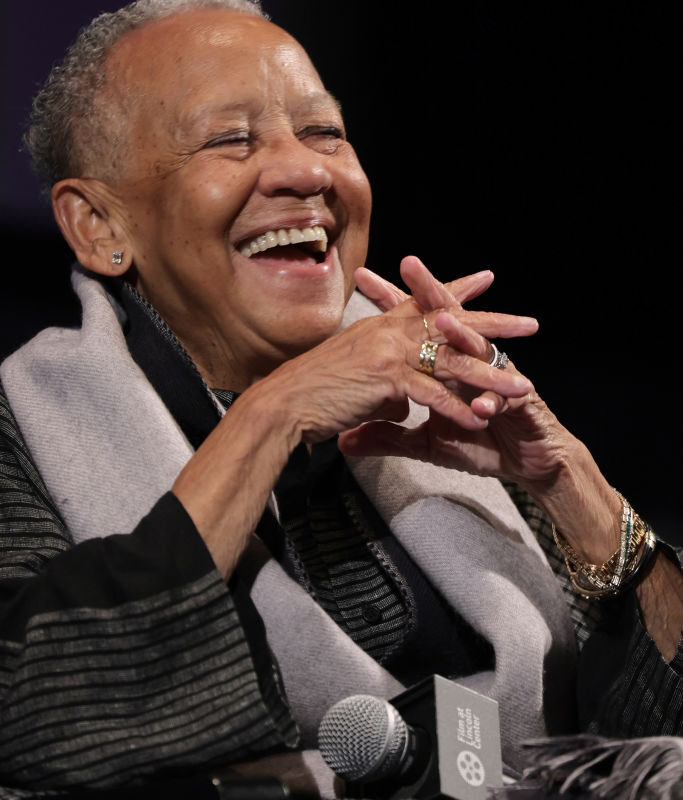Nikki Giovanni’s Insistent Black Love: A Memory

Source: Michael Loccisano / Getty
This is how I remember Nikki Giovanni, and her quick eyes and humor, her smile as wide and as brilliant as the belief she had in us Black people. Nikki died on Monday, something still too hard for those of us who don’t know a world without her, to fully understand. She was our national poet. Our national treasure. And she was these despite an America that said she’d be neither.
Nikki Giovanni was a Gemini, born beneath a June 7 sun, born onto a blood-soaked land called Knoxville, Tennessee. It was a city three driving hours from Pulaski, Tennessee, the place where the Klan was spawned. By the time Yolande Cornelia “Nikki” Giovanni Jr. took her first breath, more than 2,000 people were known to have been lynched across the failed Confederate States of America. Tennessee rounded out the top eight of the most lawless, racist and deadly.
The terror and the tenacity that must have defined those who held hard memories of that land, for Nikki, may have been mitigated by the freedom water of the Ohio River that flowed through the Cincinnati of her later childhood. Her parents moved the family to the city and then other parts of the state until Nikki was ready for high school back in Knoxville, back with her Grandparents.
She soared in that all-Black bubble and was admitted to college early–before even completing her high school studies. She’d chosen Fisk, her Grandfather’s alma mater, and there she started a literary journal–and the school’s SNCC chapter. She graduated with an honors degree in history in 1967.
And at every point, she was a poet, a role she embraced most fully, perhaps when her beloved Grandmother passed away. Instead of turning into herself in that space of pain, she turned outward, toward us and invited us to join her on a journey when she wrote in her first collection, 1968’s Black Feeling, Black Talk:
I’m into my Black Thing
And it’s filling all
My empty spots
And when she offered one of the most quoted lines of verse written during the extraordinary Black Power and Black Arts periods of the late 1960s and 1970s, Nikki reminded us in what many consider her greatest poem, “Nikki-Rosa,” that:
Black love is Black wealth
We knew her words then weren’t simply a beautiful turn of verse. They were a call to action. They were a mandate.
It was a commitment, and one she carried the whole of her life, including on the day she met a shy, insecure, unpublished, mostly secret 20-year-old poet who was me. And me, who saw the world as a series of obstacles more than one of opportunities. Here’s what happened:
We were at a gathering called together by one of my college friend’s Mother. I didn’t know what I was walking into.

Source: Jack Robinson / Getty
Black stars of the literary world were there. The fabulous keepers and makers of our culture: present and accounted for. And also me, the plus one, the girl repeatedly asked to say her name “just one more time, please.”
It was after one of those understandable, gentle requests that the unthinkable happened.
The host, my friend’s Mother, said lovingly and encouragingly to me and the room, “My son tells me this young woman is a wonderful emerging poet. So before our Nikki reads for us, let’s hear from you.” This was one of those moments when you prayed for the ability to disappear, rewrite the scene, or collapse for some unknown medical reason.
I rarely shared my poetry back then. I did with my Mother, and with a couple of close friends, including the one who had invited me to the gathering that day, only to betray me. Shy me standing there insecure and scared and with no way out. What choice did I have? I pulled out the notebook of poems I carried everywhere back then, assumed the position, and read.
I don’t remember what I read. I don’t remember if it was good or not. I don’t remember if there was polite, sort-of look at the baby applause, or a belly-deep whooping from the women in the room.
But what I do remember is the love Nikki showered on me. She did it then. She did it later, and she kept on doing it. Before I was published and at every turn after, there was Nikki. She blurbed my books, talked about the quality of the writing, not just twisty truths that powered the content of my memoirs and that some appreciated only for what they thought was a sight-line into a Black freak show.
She loved my fiction. She showered me with love and the specific sort of noticing that only happens when one sees the world through Toni Morrison’s Black Lens. She brought to life for me each time we’d talked, that Black love was truly Black wealth. I remember that.
And I remember those words became foundational to my work, to my very humanity. With varying degrees of success but never varying degrees of commitment, I carry the mandate of those into every room I enter.

Source: The Washington Post / Getty
Nikki Giovanni: Poet, writer, professor, wise-woman, mother, wife, lover, fighter, friend. You who insisted on hope, on truth, on wisdom, on possibility, on joy and on light for a people born into a nation uncommitted to any of these for us: we will keep your fire lit.
We will pass the fire on.
We will remain forever in gratitude that we shared time and space with you; and remain forever in gratitude for the roadmaps to freedom you left us in your poetry and words. And because of these, because of you, beloved sister, master teacher, know this too:
We will remain.
SEE ALSO:
7 Nikki Giovanni Poems That Will Lift Your Spirits


